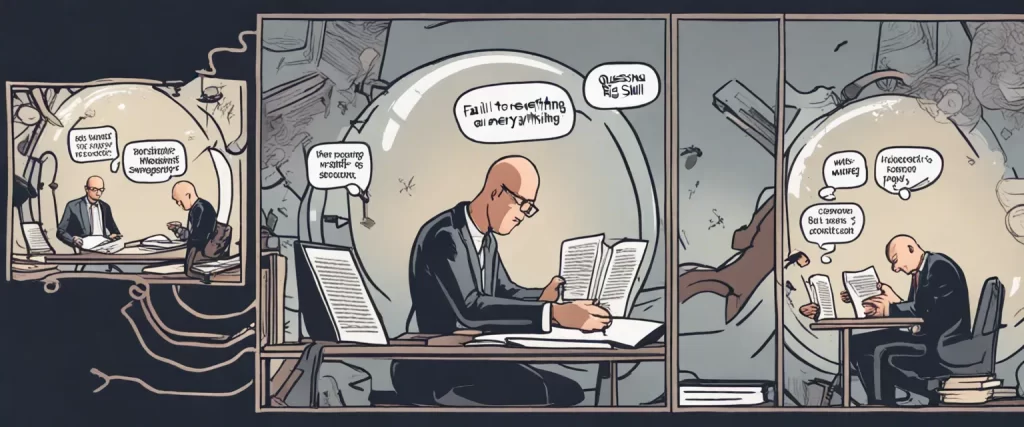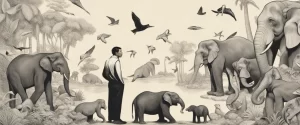——How Will You Measure Your Life? by Clayton M. Christensen & How to Fail at Almost Everything and Still Win Big by Scott Adams
In the realm of self-help literature, countless books have graced our shelves, each claiming to hold the key to personal and professional success. Among these, two titles have emerged as notable contenders, garnering considerable acclaim and amassing a dedicated following: “How Will You Measure Your Life?” by Clayton M. Christensen and “How to Fail at Almost Everything and Still Win Big” by Scott Adams. While their titles might suggest conflicting philosophies, a closer examination reveals intriguing parallels and distinct differences within these works. In this comparative study, we delve into the thought-provoking wisdom offered by Christensen and Adams, exploring their unique perspectives on achieving fulfillment and prosperity. Through an analysis of their core principles, strategies, and real-life anecdotes, we seek to uncover the underlying threads that connect – and conversely separate – these profoundly influential works. As we embark on this comparative journey, we examine the purpose behind defining a meaningful life and the various paths proposed by these authors, ultimately offering valuable insights into our own quest for personal and professional satisfaction.
Brief Summary of Two Books
How Will You Measure Your Life? by Clayton M. Christensen
How Will You Measure Your Life?” by Clayton M. Christensen is a thought-provoking book that explores the connection between personal happiness and success in different areas of life. The book draws inspiration from Christensen’s famous Harvard Business School lecture, where he challenges his students to think deeply about their lives beyond the boundaries of conventional success.
The book offers a unique perspective on finding happiness by analyzing key elements in our personal and professional lives. Christensen introduces three interconnected areas: finding meaning and happiness in relationships, making ethical decisions, and finding your purpose and motivation.
Using a blend of personal anecdotes, business case studies, and academic research, Christensen provides compelling insights and practical advice on how to navigate life’s challenges. He highlights the importance of prioritizing relationships and spending quality time with loved ones. The author also emphasizes the significance of developing a set of personal values and ethical compass to guide decision-making in both personal and professional situations.
Christensen delves into the concept of motivation and self-worth, urging readers to reflect on their true purpose in life rather than chasing superficial markers of success. Through a combination of inspiration and introspection, he encourages readers to align their values, goals, and actions to achieve a life of fulfillment and contentment.
Ultimately, “How Will You Measure Your Life?” serves as a guide for readers to reevaluate their priorities, make intentional choices, and find lasting happiness by creating a life that balances personal and professional aspirations while staying true to their core values.
How to Fail at Almost Everything and Still Win Big by Scott Adams
How to Fail at Almost Everything and Still Win Big” by Scott Adams is a self-help book that provides practical insights and strategies for achieving success despite numerous failures. The book is divided into various chapters, each focusing on a different aspect of life and career.
Adams, the creator of the Dilbert comic strip, uses his personal experiences and lessons learned from his unconventional journey to success. He emphasizes the idea of embracing failure as a crucial stepping stone towards achievement. Rather than avoiding failure, he encourages readers to learn from it, adapt, and view it as a necessary part of the learning process.
Adams introduces several key concepts throughout the book, including the benefits of developing a personal energy management system, the significance of a flexible skill set, and the importance of combining skills to create a unique and valuable talent stack.
He also delves into the power of setting goals and using systems instead of relying solely on willpower and motivation. Adams argues that systems, such as creating daily routines and habits, are more effective for long-term success compared to mere goal-setting.
Throughout the book, Adams provides practical advice on topics like nutrition, fitness, career advancement, and entrepreneurship. He stresses the importance of constantly improving oneself, embracing failure, and being open to new opportunities.
In essence, “How to Fail at Almost Everything and Still Win Big” is an inspiring and insightful book that encourages readers to adopt a growth mindset and use failure as a stepping stone to success. Adams shares his personal experiences and provides actionable advice to help readers navigate their own journeys towards achieving their goals.
Comparison between Two Books

Similarities in Career Development
Both “How Will You Measure Your Life?” by Clayton M. Christensen and “How to Fail at Almost Everything and Still Win Big” by Scott Adams touch upon various aspects of career development and provide insights on how to navigate and succeed in the professional world.
1. Importance of Reflection: Both books emphasize the significance of introspection and self-reflection in shaping one’s career. Christensen suggests reflecting upon personal values and goals as a way to align one’s choices with long-term fulfillment and success. Similarly, Adams highlights the importance of constantly reevaluating strategies, learning from failures, and adjusting career paths accordingly.
2. Balancing Short-term and Long-term Goals: Both authors stress the importance of finding a balance between short-term achievements and long-term fulfillment. Christensen argues that measuring success solely based on immediate achievements can lead to career dissatisfaction in the long run. In contrast, Adams suggests focusing on long-term skill development and adapting to change, even if it means short-term setbacks.
3. Adaptability and Resilience: Both books discuss the significance of adaptability and resilience in career development. Christensen advises being flexible and open to new opportunities, as unexpected career paths often lead to fulfilling outcomes. Likewise, Adams emphasizes the importance of embracing failure and using it as a learning experience, as it helps build resilience and enables growth.
4. Pursuing Passion and Finding Meaning: Both authors advocate for pursuing career paths that align with personal passions and values. Christensen emphasizes the importance of finding work that provides a sense of purpose and contributes to the well-being of others. Adams suggests that identifying one’s unique combination of skills and interests can lead to finding fulfilling and meaningful work.
5. Continuous Learning and Skill Development: Both books emphasize the need to continually learn and develop new skills to remain competitive in the ever-changing job market. Christensen encourages individuals to invest time in gaining new knowledge and acquiring diverse experiences. Similarly, Adams highlights the importance of constantly acquiring new skills and expanding one’s knowledge base to adapt to evolving circumstances.
Overall, both “How Will You Measure Your Life?” and “How to Fail at Almost Everything and Still Win Big” emphasize the significance of self-reflection, adaptability, resilience, pursuing passion, and continuous learning in career development. They provide valuable insights and practical strategies for individuals seeking to navigate their professional journeys successfully.
Divergences in Career Development
While both “How Will You Measure Your Life?” by Clayton M. Christensen and “How to Fail at Almost Everything and Still Win Big” by Scott Adams offer valuable insights into life and success, they diverge in their approach to career development.
In Christensen’s book, the emphasis is on finding meaning and fulfillment in one’s career by aligning personal values with work. He argues that it is important to identify your life purpose and core values first, and then pursue a career that aligns with them. Christensen believes that true success is achieved when individuals prioritize their personal lives alongside their professional accomplishments. He encourages readers to pursue work that has a positive impact on the world and to prioritize developing deep relationships with family and friends.
On the other hand, Adams presents a different perspective in his book. He encourages readers to build a system for success rather than focusing primarily on finding a specific career that aligns with their passions. Adams maintains that passion is overrated and often misunderstood. Instead, he suggests adopting a flexible approach, wherein individuals continually test and refine their systems. He advises readers to focus on developing a diverse set of skills, building a personal brand, and leveraging a combination of luck and persistence to create opportunities for success.
In the context of career development, Christensen’s approach offers a more traditional and values-driven perspective. He stresses the importance of aligning your work with your values and finding a sense of purpose. In contrast, Adams takes a more pragmatic and adaptable approach, suggesting that individuals embrace a variety of skills and be open to exploring different opportunities.
Overall, the divergence between these two books lies in how they approach career development. “How Will You Measure Your Life?” advocates for aligning work with personal values, finding purpose, and focusing on relationships, while “How to Fail at Almost Everything and Still Win Big” advocates for building a system of success, focusing on skills, personal branding, and flexibility.

Conclusion
Both “How Will You Measure Your Life?” by Clayton M. Christensen and “How to Fail at Almost Everything and Still Win Big” by Scott Adams are insightful books that offer valuable lessons.
Clayton M. Christensen’s book focuses on finding true happiness and success in life. It combines powerful business theories with personal anecdotes, encouraging readers to align their actions with their values and priorities. This book provides a thoughtful and introspective approach to measuring one’s life and is particularly relevant for individuals looking to find purpose and meaning in their personal and professional endeavors.
On the other hand, Scott Adams’ book offers a different perspective based on his experiences as a cartoonist and entrepreneur. It provides practical advice on managing opportunities, developing skills, and adopting a flexible mindset. The book emphasizes the importance of failure and continuous learning as key factors in achieving success.
Ultimately, the worthiness of each book depends on your specific interests and goals. If you are interested in reflecting on your life’s purpose and values, “How Will You Measure Your Life?” may be more relevant. On the other hand, if you are seeking practical advice on navigating a career path and embracing a growth mindset, “How to Fail at Almost Everything and Still Win Big” might be the better option.



